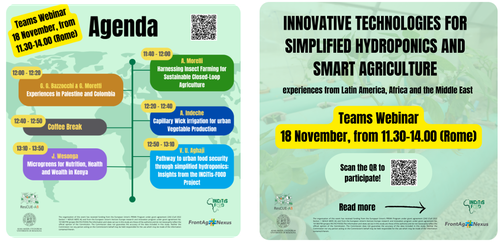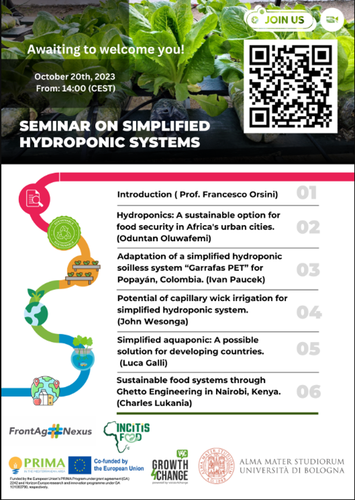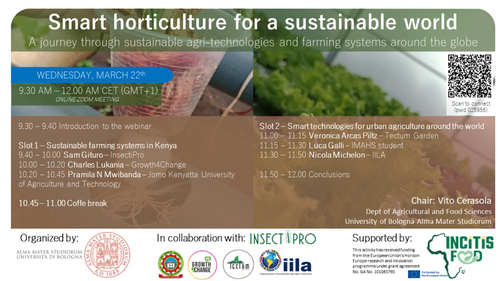
Researchers from the University of Bologna, Jomo Kenyatta University in Nairobi, and the University of Ibadan in Nigeria guided us through their experiences with simplified hydroponics, a technology that makes it possible to grow crops without soil, even in low-income urban areas. From Colombia to Palestine, Kenya to Nigeria, we saw how simple, low-cost systems, often based on recycled materials, can become powerful tools for improving access to fresh, nutritious food, optimizing the use of water and nutrients, promoting resource circularity, and strengthening the resilience of urban communities.

Hydroponics is a cutting-edge technology that allows food to be produced without soil, optimizing the use of water and nutrients. However, high costs and advanced technology risk make it accessible only to an elite, excluding the most vulnerable socio-economic contexts, such as urban areas in emerging countries. Simplified hydroponics offers a concrete solution: thanks to the use of recycled and low-cost materials, it can also be implemented in low-income environments, helping to improve access to food and food security. We discussed this on October 20, 2023, at a publicly accessible webinar with researchers from various international institutions: from the University of Ibadan (Nigeria) to the Italian-Latin American Institute (Colombia), Jomo Kenyatta University (Kenya), and the ghetto engineering initiatives promoted in Nairobi by Growth4Change. Agriculture students at Alma Mater Studiorum – University of Bologna were thus able to learn firsthand how simplified hydroponics can truly become a key tool for strengthening food security in the cities of today and tomorrow.

A day of discussion and discovery for agriculture students at Alma Mater Studiorum – University of Bologna, dedicated to sustainable and innovative horticulture in different contexts around the world. On March 22, 2023, agricultural entrepreneurs, researchers, students, and activists shared their experiences and visions on how smart horticulture can take shape from Kenya to Spain to Latin America. From insect farming to simplified hydroponics, from aquaponics to therapeutic horticulture: the publicly accessible webinar showed that smart horticulture can be not only a response to food security challenges, but also an opportunity for innovation and social inclusion, demonstrating that sustainability does not have a single path, but can be expressed in different concrete and creative solutions.